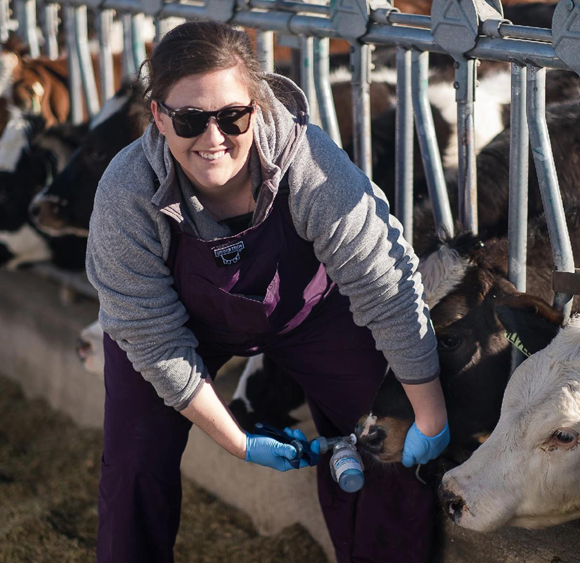Special to the Leader & Times
Last year, cattle contributed more than $11 billion to Kansas’ economy.
As the number one cattle-producing district in the nation, the success of the livestock industry is essential to the way of life in the Big First.
That success, however, did not come overnight. It is driven by ranchers and livestock producers who raise these animals, along with the veterinarians who care for them. Since she was a child, Dr. Tera Barnhardt knew she wanted to make a career caring for animals.
Growing up in Satanta, Barhardt’s family farm and feedyard provided her with early exposure to livestock. Her family grew irrigated corn, sunflowers, soybeans, and cotton.
Her grandfather purchased a purebred cattle herd in her youth. Wanting her to learn the family business, he encouraged her to work closely with the herd and the herd veterinarian. Little did he know, he would help light a spark in Barnhardt that would shape her life’s calling. At one point, the family was forced to manage a severe health challenge with their cattle on the family ranch. Barnhardt recalls the lengths their herd veterinarian went to just to make sure the herd survived.
For Dr. Barnhardt, the veterinarian’s patience and care for the herd set an example for the way she wanted to pour into her community and their animals.
Barnhardt would go on to study animal science at Kansas State University. After receiving her bachelor’s degree in 2012, she earned her doctor of veterinary medicine.
Her involvement at K-State, however, was not just limited to her studies. She was actively involved in Sigma Alpha, a professional agricultural sorority, and Collegiate Cattlewomen, where she honed her leadership and advocacy skills. She credits much of her leadership and networking skills today to her involvement in these organizations.
As an Agriculture Ambassador at K-State, she helped prospective students see the opportunities within Kansas agriculture, just as she does now for the young professionals she mentors.
She knows firsthand that agriculture thrives when we invest in the next generation, and she has made it her mission to pay it forward, especially with young women.
In the United States, women make up a little more than one-third of the population involved in beef cattle ranching. That makeup drops to just below 30 percent for women involved in cattle feedlots and dairy cattle.
In her roles as an engaged community member, businesswoman, large herd veterinarian and mentor, Barhardt feels passionate about helping encourage young women to step into leadership roles in agriculture.
While she often finds herself as one of few women at tables, she sees that as a reason to move forward rather than step back. She credits the mentors who lifted her up along the way, both male and female, for much of her success, and she remains committed to doing the same for others.
Dr. Barnhardt is not just caring for animals – she is stepping into and shaping the future leadership of Kansas agriculture. Whether she is mentoring young professionals, educating her neighbors on the science behind food, serving her community or working alongside producers to improve livestock health, she embodies the best of our state: hard work, service to others and leadership.
That’s why, in honor of National Agriculture Month and Women’s History Month, Dr. Barnhardt is First District Congressman Tracey Mann’s March Kansas Ag Hero.
For Barnhardt, her role as a large animal veterinarian allows her to serve a community that has given so much to her. Agriculture is not just her profession — it is her passion and her purpose.
“Thank you Dr. Barnhardt for your commitment to ensuring your neighbors can feed a hungry world,” Mann said in a recent press release. “It is an honor to serve you in Congress and as Chairman of the House Agriculture Committee’s Subcommittee on Livestock, Poultry and Dairy.”















